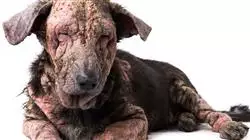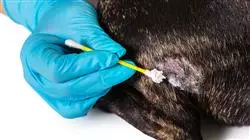University certificate
The world's largest faculty of veterinary medicine”
Introduction to the Program
Acquire the necessary skills to act as an expert in the area of Dermatological Emergencies in Small Animals, with the mastery of the latest techniques and advances in this intervention”

In emergency medicine there is a series of understandings, procedures and techniques which are common in the majority of cases, independent of the specialty or specialties involved in each case.
If we were to survey veterinary students or general veterinarians with little experience in emergency medicine and ask them which emergencies they consider the most serious and most frequent, we would most likely find on the list poisoning, cesarean sections or gastric dilatation-torsion; but it is very likely that we would find few or very few references to dermatologic emergencies.
However, in daily practice, dermatological emergencies constitute a very high percentage of emergencies and, although many of them are not serious in terms of the patient's life, many others require immediate attention because they seriously compromise the patient's life and the prognosis worsens as time goes by without medical attention; for example, reactions to drugs, angioedema or burns.
Thus, this Postgraduate certificate will deal with the care of a patient with dermatological emergencies from arrival at the emergency department, initial stabilization, as well as anamnesis, examination, complementary tests and medical treatment. In short, TECH offers a complete overview of all the areas of knowledge that professionals need to provide quality emergency care.
Get comprehensive training in all aspects of dermatologic emergency intervention through this highly effective educational program”
This Postgraduate certificate in Management of Dermatological Emergencies in Small Animals contains the most complete and up-to-date scientific program on the market. The most important features include:
- The latest technology in online teaching software
- Intensely visual teaching system, supported by graphic and schematic contents, easy to assimilate and understand
- Practical cases presented by practicing experts
- State-of-the-art interactive video systems
- Teaching supported by telepractice
- Continuous updating and recycling systems
- Autonomous learning: full compatibility with other occupations
- Practical exercises for self-assessment and learning verification
- Support groups and educational synergies: questions to the expert, debate and knowledge forums
- Communication with the teacher and individual reflection work
- Content that is accessible from any fixed or portable device with an Internet connection
- Supplementary documentation databases are permanently available, even after the program
Our innovative telepractice concept will provide you with faster integration and a much more realistic view of the content: Learning from an expert”
The teaching staff includes teaching professionals who contribute their experience to this educational program, as well as renowned specialists belonging to leading societies and prestigious universities.
Thanks to its multimedia content developed with the latest educational technology, they will allow the professionals a situated and contextual learning, that is to say, a simulated environment that will provide an immersive learning programmed to prepare in real situations.
The design of this program is based on problem-based learning, by means of which the professionals must try to solve the different professional practice situations that arise throughout the course. For this purpose, the physicians will be assisted by an innovative interactive video system developed by renowned experts in the field of veterinary medicine who have extensive teaching experience.
With the experience of veterinarians specializing in the different branches of the small animal veterinary clinic”

A high intensity Postgraduate certificate that will take you through different teaching approaches to allow you to learn in a dynamic and effective way”
Why study at TECH?
TECH is the world’s largest online university. With an impressive catalog of more than 14,000 university programs available in 11 languages, it is positioned as a leader in employability, with a 99% job placement rate. In addition, it relies on an enormous faculty of more than 6,000 professors of the highest international renown.

Study at the world's largest online university and guarantee your professional success. The future starts at TECH”
The world’s best online university according to FORBES
The prestigious Forbes magazine, specialized in business and finance, has highlighted TECH as “the world's best online university” This is what they have recently stated in an article in their digital edition in which they echo the success story of this institution, “thanks to the academic offer it provides, the selection of its teaching staff, and an innovative learning method aimed at educating the professionals of the future”
A revolutionary study method, a cutting-edge faculty and a practical focus: the key to TECH's success.
The most complete study plans on the university scene
TECH offers the most complete study plans on the university scene, with syllabuses that cover fundamental concepts and, at the same time, the main scientific advances in their specific scientific areas. In addition, these programs are continuously being updated to guarantee students the academic vanguard and the most in-demand professional skills. In this way, the university's qualifications provide its graduates with a significant advantage to propel their careers to success.
TECH offers the most comprehensive and intensive study plans on the current university scene.
A world-class teaching staff
TECH's teaching staff is made up of more than 6,000 professors with the highest international recognition. Professors, researchers and top executives of multinational companies, including Isaiah Covington, performance coach of the Boston Celtics; Magda Romanska, principal investigator at Harvard MetaLAB; Ignacio Wistumba, chairman of the department of translational molecular pathology at MD Anderson Cancer Center; and D.W. Pine, creative director of TIME magazine, among others.
Internationally renowned experts, specialized in different branches of Health, Technology, Communication and Business, form part of the TECH faculty.
A unique learning method
TECH is the first university to use Relearning in all its programs. It is the best online learning methodology, accredited with international teaching quality certifications, provided by prestigious educational agencies. In addition, this disruptive educational model is complemented with the “Case Method”, thereby setting up a unique online teaching strategy. Innovative teaching resources are also implemented, including detailed videos, infographics and interactive summaries.
TECH combines Relearning and the Case Method in all its university programs to guarantee excellent theoretical and practical learning, studying whenever and wherever you want.
The world's largest online university
TECH is the world’s largest online university. We are the largest educational institution, with the best and widest online educational catalog, one hundred percent online and covering the vast majority of areas of knowledge. We offer a large selection of our own degrees and accredited online undergraduate and postgraduate degrees. In total, more than 14,000 university degrees, in eleven different languages, make us the largest educational largest in the world.
TECH has the world's most extensive catalog of academic and official programs, available in more than 11 languages.
Google Premier Partner
The American technology giant has awarded TECH the Google Google Premier Partner badge. This award, which is only available to 3% of the world's companies, highlights the efficient, flexible and tailored experience that this university provides to students. The recognition as a Google Premier Partner not only accredits the maximum rigor, performance and investment in TECH's digital infrastructures, but also places this university as one of the world's leading technology companies.
Google has positioned TECH in the top 3% of the world's most important technology companies by awarding it its Google Premier Partner badge.
The official online university of the NBA
TECH is the official online university of the NBA. Thanks to our agreement with the biggest league in basketball, we offer our students exclusive university programs, as well as a wide variety of educational resources focused on the business of the league and other areas of the sports industry. Each program is made up of a uniquely designed syllabus and features exceptional guest hosts: professionals with a distinguished sports background who will offer their expertise on the most relevant topics.
TECH has been selected by the NBA, the world's top basketball league, as its official online university.
The top-rated university by its students
Students have positioned TECH as the world's top-rated university on the main review websites, with a highest rating of 4.9 out of 5, obtained from more than 1,000 reviews. These results consolidate TECH as the benchmark university institution at an international level, reflecting the excellence and positive impact of its educational model.” reflecting the excellence and positive impact of its educational model.”
TECH is the world’s top-rated university by its students.
Leaders in employability
TECH has managed to become the leading university in employability. 99% of its students obtain jobs in the academic field they have studied, within one year of completing any of the university's programs. A similar number achieve immediate career enhancement. All this thanks to a study methodology that bases its effectiveness on the acquisition of practical skills, which are absolutely necessary for professional development.
99% of TECH graduates find a job within a year of completing their studies.
Postgraduate Certificate in Management of Dermatological Emergencies in Small Animals
The Postgraduate Certificate in Management of Dermatological Emergencies in Small Animals is designed to provide veterinary professionals with the necessary tools to identify, diagnose and treat the most common dermatological emergencies in small animals. Although these emergencies are not commonly considered serious, the prognosis may worsen if adequate and timely therapeutic measures are not taken. Among the most common dermatologic emergencies are drug reactions, burns, and angioedema. In this program, students will have the opportunity to update themselves on the latest techniques and protocols for handling these emergencies. The contents of the program are based on the latest scientific evidence and the experience of recognized professionals in the field of veterinary dermatology.
Specialize in veterinary emergencies
Students will learn to perform a thorough initial examination and proper assessment of the patient, identify the severity of the dermatologic emergency, and take appropriate therapeutic measures to stabilize the patient and improve their prognosis. Topics such as the taking of samples for subsequent analysis, the management of wounds and skin lesions, the use of topical and systemic agents and the prevention of future dermatological emergencies will also be addressed. This Postgraduate Certificate also includes the review of real clinical cases and the resolution of problems so that students can apply the knowledge acquired in practical situations. In summary, the Postgraduate Certificate in Management of Dermatological Emergencies in Small Animals is an excellent opportunity for veterinary professionals who wish to improve their ability to identify, diagnose and treat the most common dermatological emergencies in small animals. This program offers a practical, evidence-based approach to improving patient care and achieving better outcomes.







